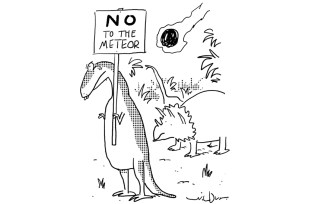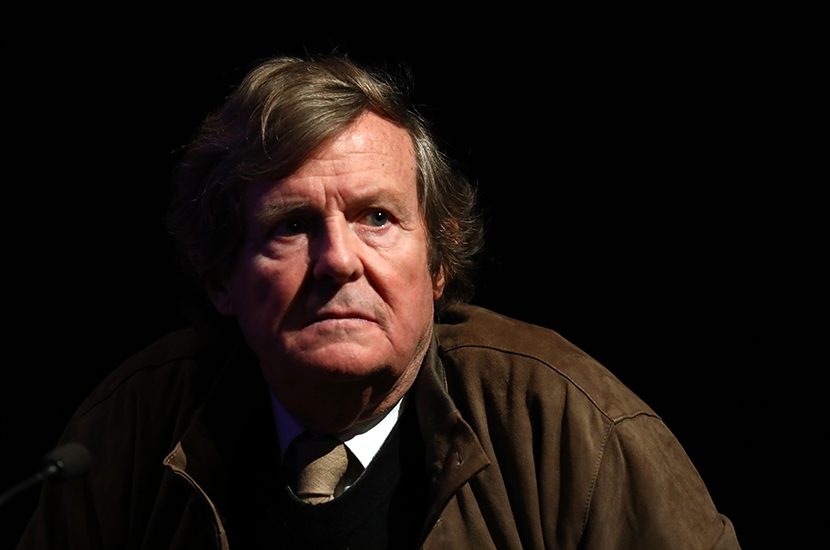Having not watched television for nine months and already growing bored of the 1,000-piece jigsaw of General Alfredo Stroessner (part of the ‘Vigorous Leaders’ range from Waddingtons), my wife suggested — for a novelty — that maybe we should take in the new political thriller starring Hugh Laurie, called Roadkill.
We have fond memories of Laurie from previous dramas and are both mildly interested in politics, so it seemed an agreeable idea. ‘What side is it on?’ I asked, with a note of warning. ‘BBC One,’ replied the missus, and we looked at each other glumly and I said: ‘Oh Christ. It’ll be a woke BAME-athon. Isn’t there an old episode of Midsomer Murders on somewhere, one starring John Nettles and with DS Troy being disparaging about homosexuals and gypsies?’ But there wasn’t — I think they’ve all been purged.
So we watched Roadkill and continued watching even as that dread word appeared in the title sequence, the word which popped up from its form, ears twitching, a look of utter self-righteousness on its face, the word which should have made us turn off immediately, the awful, killer word: Hare. Hare. Hare again. Hare today, Hare tomorrow. Is there a worse playwright in the country?

And indeed considerable misery stretched out before us — a script devoid of even the slenderest vestiges of wit, nuance, intelligence, tension and truth. Like being harangued for an hour by a needy and not very bright adolescent. Viciously biased, hideously right-on, moronic in its assumptions, devoid of that most crucial thing for a play, drama.
How thick does Hare think we are? He clearly believes we need educating about the vileness of the Conservative party and he is the man to do this, from his Hampstead mansion. And each time he dribbles out more of this sub-Marxist guff the BBC is ready and waiting to lap it up. In Roadkill, the lead character — the villain — was a plasticine hybrid of Boris Johnson and Nigel Farage. A smug ‘populist’ with a filthy past and a dishonest present. Yes, enough already, we get your point. Clunking scene changes to emphasise the point — the switch from the rotten food in a women’s prison to the delightful canapés eaten by vile Tories.
One of the jobs of a screenwriter or dramatist is surely to challenge the orthodoxies of their time
And the lies, the lies. Yes, such dramas are fiction, a made-up world, and so one should not mind lies. But Hare has no imagination except for that stunted tinplate thing which exists inside all thick lefties: Roadkill is his vision of the world as he would want it to be and also how he kind of thinks it is. And so pretty much the entire judiciary is BAME — the judges, the barristers, the lawyers, the solicitors, as if our legal system had been franchised out to the cast of Porgy and Bess, as well as being largely female.
But a shot of the Conservative party cabinet showed an ocean of white faces, largely male. That is what I mean by a lie — a deliberate lie. In reality, it is the other way around, of course. There are too few black High Court judges, but plenty of BAME representatives within Boris Johnson’s cabinet. But to show that would go against the essence of Hare’s confection, which is rooted in the absurd notion that Tories dislike black people while the rest of society has somehow ‘moved on’.
The race element of Roadkill, incidentally, destroyed what little drama existed in the screenplay in the first place. You could tell whether a character was ‘good’ or ‘bad’ by either the colour of their skin or their gender. White men bad, black men good. Black women better still. Black transgender woman? Oh yes, tick that box. Positively sainted. And so, as a consequence, there was not much in the way of mystery.
I am not a Conservative and never have been, even if I did vote for them once, so cannot be accused of taking personal offence. More to the point, I would guess that a good 75 per cent of the films I have watched and the books I have read came from a broadly left-wing perspective and they have been, for the most part, greatly enjoyed. You cannot loathe left-wing literature, film and drama if among your heroes are Auden, Orwell, Turgenev, Mayakovsky, Moravia, Ferlinghetti, the great Norman Jewison, the berserk but always interesting Oliver Stone — oh, and of course Harold Pinter.
It is only when the political perspective of the writer obliterates everything else — especially the humanity — that the book gets cast away or the film turned off. When the suspicion descends that you have paid good money, perhaps at Waterstones or the Curzon cinema, or through your licence fee, simply to endure a village idiot hitting you over the head repeatedly with a large mallet.
In truth, I too often feel this way when watching BBC dramas: not an annoyance that their perspective is necessarily wrong as I see it, just that it is utterly ubiquitous and beyond that incontestable, that their view is right and it is the only view. One of the jobs of a screenwriter or dramatist is surely to challenge the orthodoxies of their time, to pick away at the inevitable contradictions, to offer us something of a surprise — and to do all of this with a degree of subtlety so that you believe in the characters to whom you have been introduced. There’s none of that with Hare, ever.
You have to feel a little for the new director-general, Tim Davie. He inherits an organisation which, almost as one, feels at one with the Hare-brained agenda and, worse still, thinks that the population beyond the North Circular either feel the same or would do if they weren’t all thick.
Back to the jigsaw, then. It’s Alf’s array of medals which are the biggest problem, and I will have the same problem with the next puzzle, Ariel Sharon.







Comments